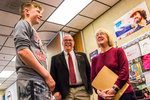
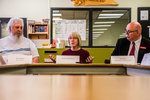
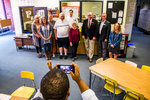
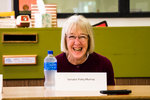
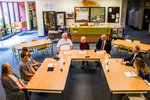
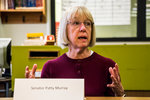
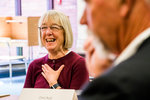
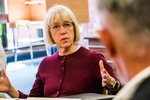
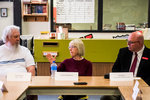
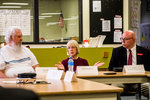
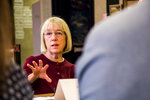
Sen. Patty Murray spent Wednesday afternoon touring Toledo High School, hearing the success stories of broadband access and digital education in the community — and touting her efforts to expand access to underserved areas.
“Toledo’s so far ahead of so many places, but I want Toledo for everybody,” Murray said.
Murray heard from educators, students, elected officials and business leaders, all of whom praised efforts in Toledo to boost connectivity and learning. ToledoTel has provided the community with a high-speed fiber optic network, giving the rural community some of the fastest internet in the country. Students in the school are learning digital communication tools, coding and video game design.
Leaders said access to technology has helped Toledo grow.
“Historically, prior to (the fiber) project, we’d get one or two houses built here a year,” said ToledoTel COO Dale Merten. “Since word about fiber got out, we’re getting 40 to 45 houses a year.”
Merten noted the company’s efforts not just to expand access, but to provide people with tools and training to be able to understand how to use it. Through a grant program, ToledoTel was able to provide new customers with a laptop, 40 hours of training and a two-year subscription. Employees even went door-to-door to get the word out, boosting the company’s subscriptions from 40 percent of residents in the service area to 95 percent in two years.
That success story is what Murray wants to see more of. Her Digital Equity Act would set up a pair of $125 million grant programs to build skill and support opportunities to “take full advantage” of a broadband connection.
“We actually have two grant programs we’ve written in, one to states so they can disseminate it that way, but the one I like best is the competitive grant program,” she said. “A community like this can say, ‘Here’s what we can do with this, here’s how we would build that, how many people it would serve, what a difference it would make for our community.’ … The grant program would allow them to put together their libraries or their schools or their senior citizen centers to provide the place and skills teaching for that.”
During her tour, Murray talked to a student who had used computer-aided design software to make blueprints for a house. Megan Martin, who teaches digital courses at the high school, said the school will next year partner with the Amazon Future Engineers program to offer more opportunities for students.
Toledo Mayor Steve Dobosh noted the importance of Internet connectivity for modern students.
“Everyone must have the ability to do homework online,” he said. “Many college classes are online.”
Meanwhile, Toledo School District Superintendent Chris Rust said Murray’s Digital Equity Act could help close gaps in struggling communities. While the district has high-speed Internet thanks to ToledoTel, it still relies on hand-me-down computers from the state.
“Your proposed bill would address some of those shortfalls experienced by rural communities,” he said. “We look forward to that passing.”
Eric Hayes and Cindy Samco also spoke during a discussion period at the school. The pair moved to Toledo from Portland a year ago. Working as mobile app developers, they selected their new home because of the quality of the broadband.
“When we went out looking for a place to live, the Internet was the No. 1 qualifier,” Hayes said. “Everywhere off of I-5 in Cowlitz and Lewis County, you don’t find Internet, except for Toledo.”
Samco said their Internet now is faster than it was in Portland, but the community still has work to do in getting local businesses and residents to have a web presence of their own.
Murray said the discussion reinforced her commitment to providing more digital access. In addition to ongoing efforts to expand connectivity, she added that training is important as well.
“One of the things I feel so passionate about is we are becoming a nation of haves and have-nots when it comes to having access to digital,” she said. “And it means everything, whether it’s education, whether it’s senior citizens being able to contact Medicare, whether it’s communities being able to get information to their citizens. ... There’s another part of this too. It’s like giving somebody a car if they don’t know how to drive it. We want to make sure we don’t just get broadband to people, but they actually have the skills, they know how to use it.”